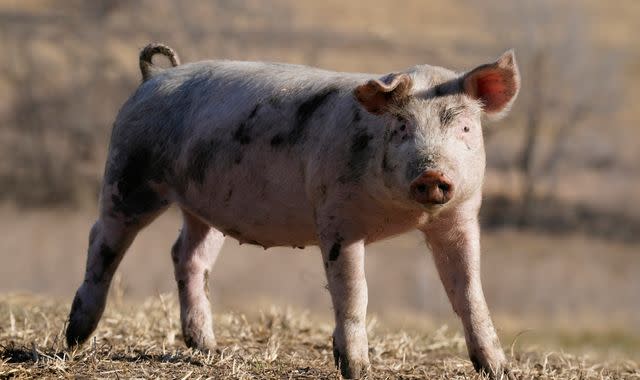Highly antibiotic resistant strain of MRSA that arose in pigs can jump to humans, scientists say

A highly antibiotic resistant strain of MRSA that arose in pigs thanks to farming practices can jump to humans, scientists say.
The strain has become the dominant type of MRSA among livestock in Europe over the past 50 years but is now a growing cause of MRSA in humans.
Scientists have been increasingly worried about antibiotic resistance in recent years, and experts last year warned of a "hidden pandemic" following the COVID-19 crisis.
A new study found that the CC398 strain has maintained its antibiotic resistance over decades in pigs and other livestock and is capable of rapidly adapting to human hosts while maintaining that resistance.
"Historically high levels of antibiotic use (on pig farms) may have led to the evolution of this highly antibiotic resistant strain of MRSA," said Dr Gemma Murray, a lead author of the study published in eLife.
The results highlight the potential threat that this strain of MRSA poses to public health.
It has been associated with increasing numbers of human infections, in people who have and have not had direct contact with livestock.
Antibiotic use in European livestock is much lower than it has been in the past, but researchers believe recent reductions are likely to have a limited impact on the presence of this strain of MRSA in pigs because it is so stable.
"Understanding the emergence and success of CC398 in European livestock - and its capacity to infect humans - is vitally important in managing the risk it poses to public health," said Dr Lucy Weinert in the University of Cambridge's Department of Veterinary Medicine, senior author of the paper.
"Cases of livestock-associated MRSA in humans are still only a small fraction of all MRSA cases in human populations, but the fact that they're increasing is a worrying sign," she added.
Read more:
Antibiotic could save millions of lives from superbugs after study eradicates MRSA in mice
Intensification of farming, combined with high levels of antibiotic use in livestock, has led to particular concerns about livestock as reservoirs of antibiotic-resistant human infections.
More than 1.2 million people died from drug-resistant infections in 2019, according to a recent study, amid warnings from the World Health Organisation.
What is MRSA?
MRSA (methicillin-resistant Staphylococcus aureus) is a type of bacteria that's resistant to several widely used antibiotics.
It can be harder to treat than other bacterial infections because of this resistance.
MRSA lives harmlessly on the skin of around 1 in 30 people, according to the NHS, usually in the nose, armpits and groin area - this is called "carrying" MRSA.
This is harmless and in most cases will go away on its own within a matter of days, weeks or months.
However, if it gets deeper into your system it can cause an infection.
This is why it is most common in people who stay in hospital, because there are more opportunities for the bacteria to enter the body, such as through wounds, feeding tubes, catheters or drips.

 Yahoo News
Yahoo News 
